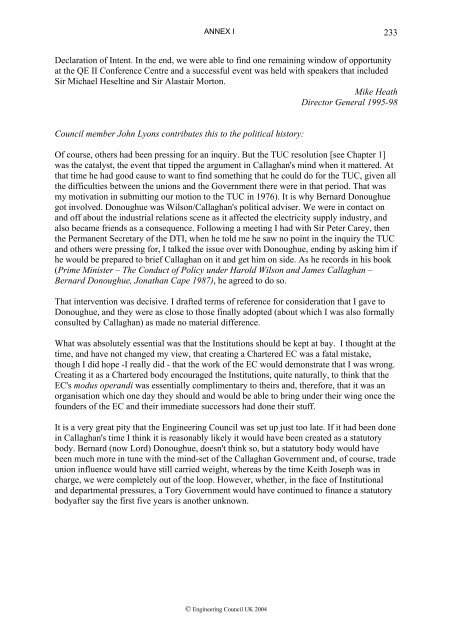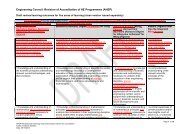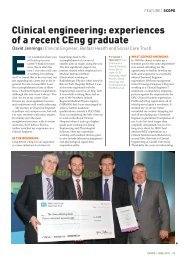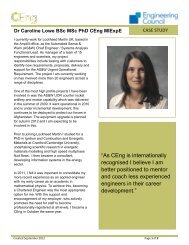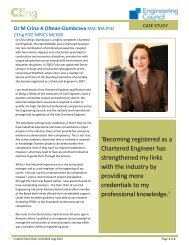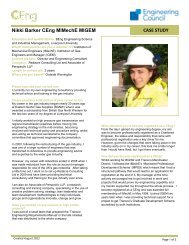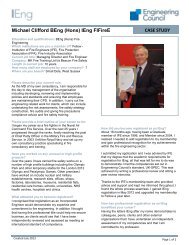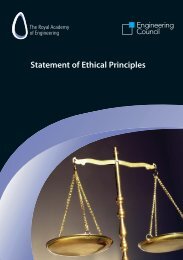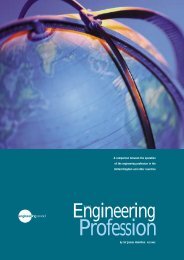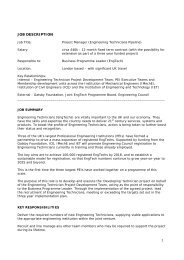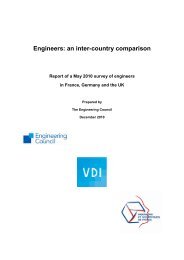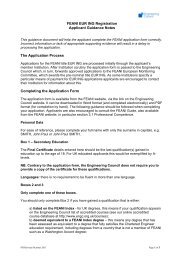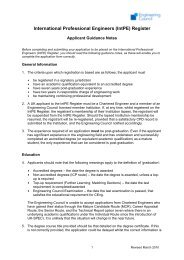An Engine for Change - A Chronicle of the Engineering Council
An Engine for Change - A Chronicle of the Engineering Council
An Engine for Change - A Chronicle of the Engineering Council
You also want an ePaper? Increase the reach of your titles
YUMPU automatically turns print PDFs into web optimized ePapers that Google loves.
ANNEX I 233Declaration <strong>of</strong> Intent. In <strong>the</strong> end, we were able to find one remaining window <strong>of</strong> opportunityat <strong>the</strong> QE II Conference Centre and a successful event was held with speakers that includedSir Michael Heseltine and Sir Alastair Morton.Mike HeathDirector General 1995-98<strong>Council</strong> member John Lyons contributes this to <strong>the</strong> political history:Of course, o<strong>the</strong>rs had been pressing <strong>for</strong> an inquiry. But <strong>the</strong> TUC resolution [see Chapter 1]was <strong>the</strong> catalyst, <strong>the</strong> event that tipped <strong>the</strong> argument in Callaghan's mind when it mattered. Atthat time he had good cause to want to find something that he could do <strong>for</strong> <strong>the</strong> TUC, given all<strong>the</strong> difficulties between <strong>the</strong> unions and <strong>the</strong> Government <strong>the</strong>re were in that period. That wasmy motivation in submitting our motion to <strong>the</strong> TUC in 1976). It is why Bernard Donoughuegot involved. Donoughue was Wilson/Callaghan's political adviser. We were in contact onand <strong>of</strong>f about <strong>the</strong> industrial relations scene as it affected <strong>the</strong> electricity supply industry, andalso became friends as a consequence. Following a meeting I had with Sir Peter Carey, <strong>the</strong>n<strong>the</strong> Permanent Secretary <strong>of</strong> <strong>the</strong> DTI, when he told me he saw no point in <strong>the</strong> inquiry <strong>the</strong> TUCand o<strong>the</strong>rs were pressing <strong>for</strong>, I talked <strong>the</strong> issue over with Donoughue, ending by asking him ifhe would be prepared to brief Callaghan on it and get him on side. As he records in his book(Prime Minister – The Conduct <strong>of</strong> Policy under Harold Wilson and James Callaghan –Bernard Donoughue, Jonathan Cape 1987), he agreed to do so.That intervention was decisive. I drafted terms <strong>of</strong> reference <strong>for</strong> consideration that I gave toDonoughue, and <strong>the</strong>y were as close to those finally adopted (about which I was also <strong>for</strong>mallyconsulted by Callaghan) as made no material difference.What was absolutely essential was that <strong>the</strong> Institutions should be kept at bay. I thought at <strong>the</strong>time, and have not changed my view, that creating a Chartered EC was a fatal mistake,though I did hope -I really did - that <strong>the</strong> work <strong>of</strong> <strong>the</strong> EC would demonstrate that I was wrong.Creating it as a Chartered body encouraged <strong>the</strong> Institutions, quite naturally, to think that <strong>the</strong>EC's modus operandi was essentially complimentary to <strong>the</strong>irs and, <strong>the</strong>re<strong>for</strong>e, that it was anorganisation which one day <strong>the</strong>y should and would be able to bring under <strong>the</strong>ir wing once <strong>the</strong>founders <strong>of</strong> <strong>the</strong> EC and <strong>the</strong>ir immediate successors had done <strong>the</strong>ir stuff.It is a very great pity that <strong>the</strong> <strong>Engine</strong>ering <strong>Council</strong> was set up just too late. If it had been donein Callaghan's time I think it is reasonably likely it would have been created as a statutorybody. Bernard (now Lord) Donoughue, doesn't think so, but a statutory body would havebeen much more in tune with <strong>the</strong> mind-set <strong>of</strong> <strong>the</strong> Callaghan Government and, <strong>of</strong> course, tradeunion influence would have still carried weight, whereas by <strong>the</strong> time Keith Joseph was incharge, we were completely out <strong>of</strong> <strong>the</strong> loop. However, whe<strong>the</strong>r, in <strong>the</strong> face <strong>of</strong> Institutionaland departmental pressures, a Tory Government would have continued to finance a statutorybodyafter say <strong>the</strong> first five years is ano<strong>the</strong>r unknown.© <strong>Engine</strong>ering <strong>Council</strong> UK 2004


